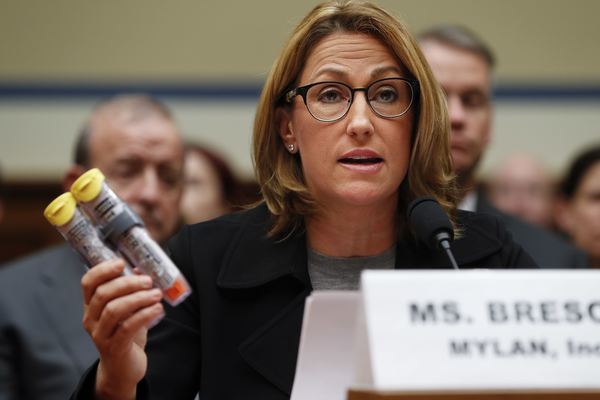CHARLESTON – A class action lawsuit has been filed against Mylan alleging the company violated consumer protection laws and the Racketeer Influenced and Corrupt Organization Act by upping the price of the epinephrine auto-injector.
Amber Rainey, Christina Kollmeyer and Lisa Vogel filed the lawsuit April 3 in the U.S. District Court for the Western District of Washington.
The plaintiffs claim while the vast majority of allergies result in a mild rash and can be treated with over-the-counter medication, people with allergies to certain foods and bee stings can develop anaphylaxis, which causes the airways to swell and close.
“Anaphylaxis can be treated with epinephrine, or adrenaline, a naturally occurring hormone and neurotransmitter that has available for over 100 years and costs pennies to produce,” the complaint states. “Nearly ten years ago … Mylan acquired the rights to market and distribute the EpiPen, a prescription auto-injector containing epinephrine that was originally approved by the FDA in 1987.”
Even though epinephrine has been widely available for more than a century, and all the components of an EpiPen together cost anywhere between $20 and $30 to make, Mylan has increased the list prices of EpiPens 17 times since it acquired the rights to market and distribute the drug in 2007 — a 574 percent increase — from $90.28 to $608.62.
The plaintiffs claim Mylan’s price increases for EpiPen have been so dramatic that some patients have resorted to carrying expired EpiPens, or using syringes to manually inject epinephrine.
Mylan has admitted that it pays intermediaries in the pharmaceutical distribution system known as “pharmacy benefit managers” and that those payments increase the price that many consumers pay, according to the suit.
“PBMs negotiate prices with drug manufacturers on behalf of health plans,” the complaint states. “Together, the three biggest PBMs — Express Scripts, CVS Health and OptumRx
— bring in more than $200 billion a year in revenue. They also control over 80% of the PBM market, covering 180 million insured people.”
The plaintiffs claim PBMs have enormous control over drug purchasing behavior because they can push patients toward certain brand drugs over others.
On Sept. 21, Mylan CEO Heather Bresch testified before the House of Representatives Committee on Oversight and Government Reform that, while an EpiPen costs $608, Mylan only received $274 after rebates and fees, according to the suit.
The plaintiffs claim during the time that the lost prices for EpiPen were increasing most dramatically, there were other companies that tried to introduce auto-injectors to compete with EpiPen, but, because those competitors would not pay the rebates Mylan paid the PBMs, they couldn’t succeed in displacing EpiPen’s market dominance.
“If Mylan had been truly concerned about the patients who were victims of how it gamed the system, it could have refused to pay the game, and competed based on the merits of its product,” the complaint states. “Indeed, Mylan has regularly represented that it believes its auto-injector is superior to those of its competitors. But, Mylan did not make that choice. Instead, it chose to participate in the scheme described in this complaint.”
The plaintiffs claim that, unfortunately, while neither PBMs nor other intermediaries in the pharmaceutical distribution chain pay Mylan’s inflated list price, many patients who rely on EpiPen to keep them alive — including consumers with high deductible plans, insured consumers who pay coinsurance or uninsured consumers — do pay either the full list price or an inflated amount based on that price.
“Mylan’s list price inflation has saddled individuals living with food allergies with crushing out-of-pocket expenses,” the complaint states.
By engaging in a scheme and enterprise whose purpose was unlawfully inflating the list price for EpiPen then marketing the spread of PBMs, Mylan has violated the RICO Act and various state consumer protection laws, according to the suit.
The plaintiffs are seeking compensatory damages. They are being represented by Steve W. Berman nad Jennifer Fountain Connolly of Hagens Berman Sobol Shapiro; and Craig L. Briskin of Mehri & Skalet.
Bresch is the daughter of U.S. Sen. Joe Manchin.
U.S. District Court for the Western District of Washington case number: 3:17-cv-05244
Source: wvrecord.com




